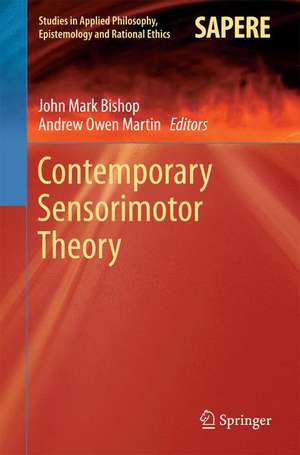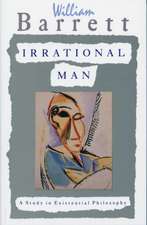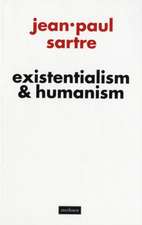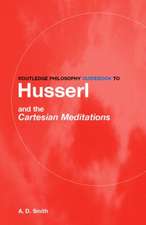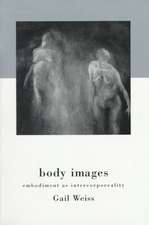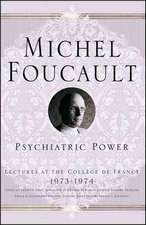Contemporary Sensorimotor Theory: Studies in Applied Philosophy, Epistemology and Rational Ethics, cartea 15
Editat de John Mark Bishop, Andrew Owen Martinen Limba Engleză Hardback – 21 feb 2014
Why does a circle look curved and not angular? Why does red not sound like a bell? Why, as I interact with the world, is there something it is like to be me? An analytic philosopher might suggest: ``if we ponder the concept of circle we find that it is the essence of a circle to be round’’. However, where does this definition come from? Was it set in stone by the Gods, in other words by divine arbiters of circleness, redness and consciousness? Particularly, with regard to visual consciousness, a first attempt to explain why our conscious experience of the world appears as it does has been attributed to Kevin O’Regan and Alva Noe, who published their sensorimotor account of vision and visual consciousness in 2001.
Starting with a chapter by Kevin O’Regan, Contemporary Sensorimotor Theory continues by presenting fifteen additional essays on as many developments achieved in recent years in this field. It provides readers with a critical review of the sensorimotor theory and in so doing introduces them to a radically new enactive approach in cognitive science.
| Toate formatele și edițiile | Preț | Express |
|---|---|---|
| Paperback (1) | 985.35 lei 6-8 săpt. | |
| Springer International Publishing – 3 sep 2016 | 985.35 lei 6-8 săpt. | |
| Hardback (1) | 991.60 lei 6-8 săpt. | |
| Springer International Publishing – 21 feb 2014 | 991.60 lei 6-8 săpt. |
Din seria Studies in Applied Philosophy, Epistemology and Rational Ethics
- 20%
 Preț: 603.89 lei
Preț: 603.89 lei -
 Preț: 397.59 lei
Preț: 397.59 lei -
 Preț: 359.53 lei
Preț: 359.53 lei - 20%
 Preț: 989.96 lei
Preț: 989.96 lei - 24%
 Preț: 787.48 lei
Preț: 787.48 lei -
 Preț: 390.08 lei
Preț: 390.08 lei -
 Preț: 370.88 lei
Preț: 370.88 lei - 15%
 Preț: 641.20 lei
Preț: 641.20 lei - 20%
 Preț: 646.95 lei
Preț: 646.95 lei - 15%
 Preț: 653.98 lei
Preț: 653.98 lei -
 Preț: 384.48 lei
Preț: 384.48 lei -
 Preț: 395.47 lei
Preț: 395.47 lei - 18%
 Preț: 1216.95 lei
Preț: 1216.95 lei - 18%
 Preț: 947.50 lei
Preț: 947.50 lei -
 Preț: 388.72 lei
Preț: 388.72 lei -
 Preț: 390.08 lei
Preț: 390.08 lei -
 Preț: 395.09 lei
Preț: 395.09 lei -
 Preț: 394.12 lei
Preț: 394.12 lei - 15%
 Preț: 644.82 lei
Preț: 644.82 lei - 15%
 Preț: 698.15 lei
Preț: 698.15 lei - 18%
 Preț: 1840.91 lei
Preț: 1840.91 lei - 20%
 Preț: 656.84 lei
Preț: 656.84 lei -
 Preț: 389.70 lei
Preț: 389.70 lei - 20%
 Preț: 991.46 lei
Preț: 991.46 lei - 15%
 Preț: 585.73 lei
Preț: 585.73 lei - 15%
 Preț: 711.40 lei
Preț: 711.40 lei - 15%
 Preț: 589.33 lei
Preț: 589.33 lei - 15%
 Preț: 700.42 lei
Preț: 700.42 lei
Preț: 991.60 lei
Preț vechi: 1239.50 lei
-20% Nou
Puncte Express: 1487
Preț estimativ în valută:
189.74€ • 198.64$ • 156.100£
189.74€ • 198.64$ • 156.100£
Carte tipărită la comandă
Livrare economică 07-21 aprilie
Preluare comenzi: 021 569.72.76
Specificații
ISBN-13: 9783319051062
ISBN-10: 3319051067
Pagini: 263
Ilustrații: X, 253 p. 16 illus., 5 illus. in color.
Dimensiuni: 155 x 235 x 22 mm
Greutate: 0.54 kg
Ediția:2014
Editura: Springer International Publishing
Colecția Springer
Seria Studies in Applied Philosophy, Epistemology and Rational Ethics
Locul publicării:Cham, Switzerland
ISBN-10: 3319051067
Pagini: 263
Ilustrații: X, 253 p. 16 illus., 5 illus. in color.
Dimensiuni: 155 x 235 x 22 mm
Greutate: 0.54 kg
Ediția:2014
Editura: Springer International Publishing
Colecția Springer
Seria Studies in Applied Philosophy, Epistemology and Rational Ethics
Locul publicării:Cham, Switzerland
Public țintă
ResearchCuprins
The Explanatory Status of the Sensorimotor Approach to Phenomenal Consciousness, and its Appeal to Cognition.- Heideggerian Credentials? O’Regan’s Sensorimotor Approach to Perception and Robots that Feel.- The Phenomenology of Sensorimotor Understanding.- How Enactive is the Dynamic Sensorimotor Account of Raw Feel?: Discussing some Insights from Phenomenology and the Cognitive Sciences.- Experience and consciousness: Concepts from the outside in.- Sensorimotor knowledge and the radical alternative.- The Problem of Invisible Content.- Beyond Vision: extending the scope of a sensorimotor account of perception.- From a Sensorimotor to a Sensorimotor++ Account of Embodied Conceptual Cognition.- Conscious Sensation, Conscious Perception and Sensorimotor Theories of Consciousness.- Basic Pretending as Sensorimotor Engagement? Lessons from Sensorimotor Theory for the Debate on Pretence.- Investigating Sensorimotor Contingencies in the Enactive Interface.- Non-Representational Interaction Design.- Minimally Cognitive Robotics: Body Schema, Forward Models, and Sensorimotor Contingencies in a Quadruped Machine.- Human language and sensorimotor contingency.
Notă biografică
John Mark Bishop is currently Professor of Cognitive Computing in the Department of Computing at Goldsmiths, University of London and Chair of AISB (Society for the study of Artificial Intelligence and the Simulation of Behaviour).
Andrew Owen Martin completed his MSc in Cognitive Computing at Goldsmiths, University of London, in 2011. He is currently PhD.C. in the same university. His research focuses on sensory substitution and enactivism.
Andrew Owen Martin completed his MSc in Cognitive Computing at Goldsmiths, University of London, in 2011. He is currently PhD.C. in the same university. His research focuses on sensory substitution and enactivism.
Textul de pe ultima copertă
This book analyzes the philosophical foundations of sensorimotor theory and discusses the most recent applications of sensorimotor theory to human computer interaction, child’s play, virtual reality, robotics, and linguistics.
Why does a circle look curved and not angular? Why does red not sound like a bell? Why, as I interact with the world, is there something it is like to be me? An analytic philosopher might suggest: ``if we ponder the concept of circle we find that it is the essence of a circle to be round’’. However, where does this definition come from? Was it set in stone by the Gods, in other words by divine arbiters of circleness, redness and consciousness? Particularly, with regard to visual consciousness, a first attempt to explain why our conscious experience of the world appears as it does has been attributed to Kevin O’Regan and Alva Noe, who published their sensorimotor account of vision and visual consciousness in 2001.
Starting with a chapter by Kevin O’Regan, Contemporary Sensorimotor Theory continues by presenting fifteen additional essays on as many developments achieved in recent years in this field. It provides readers with a critical review of the sensorimotor theory and in so doing introduces them to a radically new enactive approach in cognitive science.
Why does a circle look curved and not angular? Why does red not sound like a bell? Why, as I interact with the world, is there something it is like to be me? An analytic philosopher might suggest: ``if we ponder the concept of circle we find that it is the essence of a circle to be round’’. However, where does this definition come from? Was it set in stone by the Gods, in other words by divine arbiters of circleness, redness and consciousness? Particularly, with regard to visual consciousness, a first attempt to explain why our conscious experience of the world appears as it does has been attributed to Kevin O’Regan and Alva Noe, who published their sensorimotor account of vision and visual consciousness in 2001.
Starting with a chapter by Kevin O’Regan, Contemporary Sensorimotor Theory continues by presenting fifteen additional essays on as many developments achieved in recent years in this field. It provides readers with a critical review of the sensorimotor theory and in so doing introduces them to a radically new enactive approach in cognitive science.
Caracteristici
Provides an insight into the contemporary state of sensorimotor theories and their place in modern cognitive science Offers an interesting selection of current research informed by the sensorimotor account of perception Edited and written by leading experts in the field
